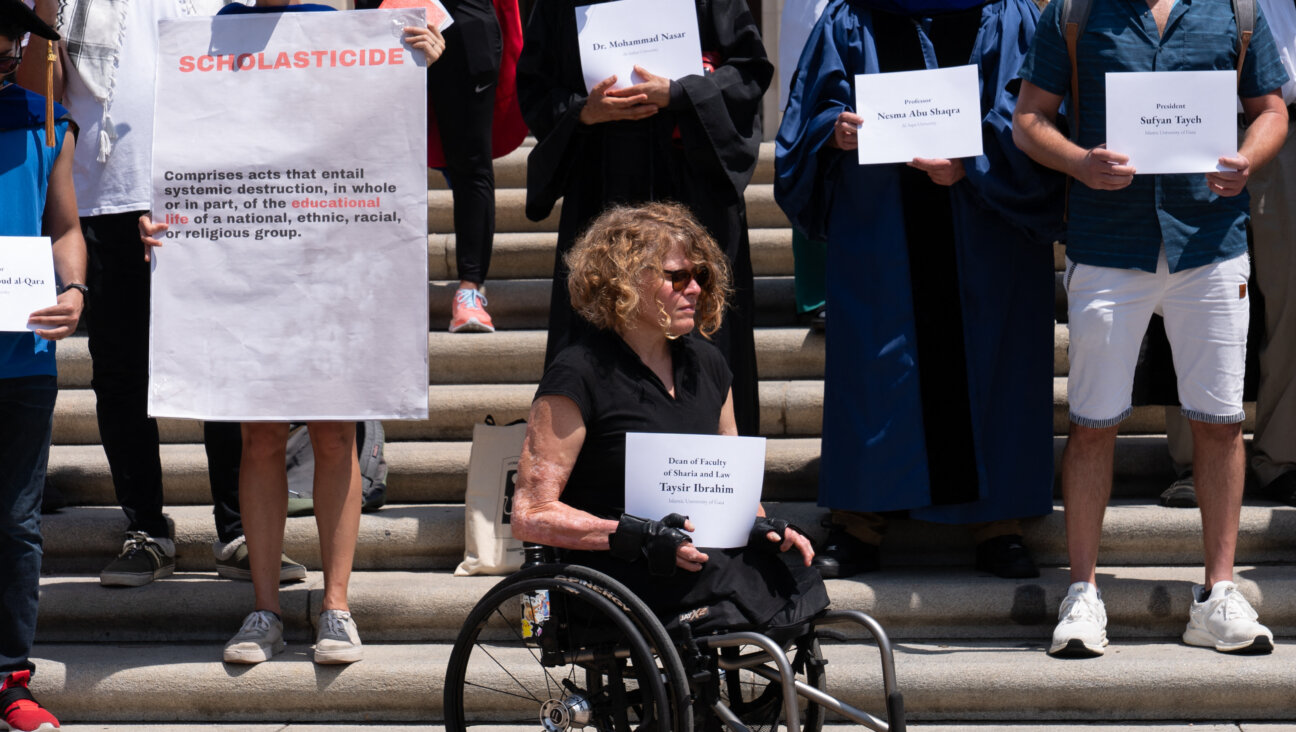Staying Afloat
With food and oil prices skyrocketing, the stock and housing markets in tatters, and the threat of a recession looming on the horizon, now is not the easiest time to ask donors to open their checkbooks. Across the country, these economic ills are being felt not only by individuals and families, but also by a whole range of Jewish institutions, from synagogues to food banks to social service not-for-profits that depend upon the generosity of donors to stay afloat. As a result, not-for-profits are looking for ways to get creative so that they can make it through the hard times and carry out their missions.
There are, as of yet, no clear data on how the economic slowdown will affect donations. In fact, the effects may not be fully clear until the end of the year, as many donors make their gifts in late December, for tax purposes. An informal survey by the Forward of a range of synagogues, schools and not-for-profit organizations showed a surprisingly varied landscape: Some were already feeling the pinch, some said donations appear to be holding steady and some were even seeing an upsurge in giving. What they all shared was a sense that there may be rocky times ahead.
According to Gary Tobin, who is president of the Institute for Jewish & Community Research, a think tank that studies issues related to Jewish giving, fluctuations in levels of giving often have as much to do with what donors think might happen as with current economic conditions.
“Most of it is about expectations and perceptions,” Tobin said. “I think there’s a tremendous amount of uncertainty ahead. The psychology of uncertainty can affect giving as much as anything else.”
So far, a number of not-for-profits say they haven’t seen signs of a major downturn in donations. Even UJA-Federation of New York, which relies heavily on donations from Wall Street and thus was expected to take a sharp hit from the woes at such securities firms as Bear Stearns and Lehman Brothers, looks like it will surpass last year’s annual campaign of $151 million by $2 million or $3 million, according to Paul Kane, senior vice president for financial resources development at UJA-Federation of New York. Kane said he still expects a difficult year ahead, and that it will be essential for his federation to look beyond Wall Street for its fundraising and toward other, stronger sectors, like real estate.
One thing that Kane and other fundraising professionals mentioned was the need to show understanding to people who are facing tough times.
“With someone who’s lost their job and can’t contribute, we say, ‘Any way we can be helpful, we still want to be helpful,’” Kane said. “If you show that respect to a donor who has a difficult time, they’ll return to the fold when they have the capabilities.”
Still, some not-for-profits are pushing as hard as they can. Several said they have been stepping up their requests to donors, sending out additional mailings and sharpening their pitches. Simon Greer, president and CEO of Jewish Funds for Justice, which is a liberal grant-making and advocacy organization focused on social and economic issues, said that his organization was working to make sure that more donors got out into the field to see the work it does. For example, a staffer had recently taken donors to East Baltimore to see the houses that JFJ is fixing up. “I would’ve thought that’s a nice thing to do when the economy is booming,” Greer said. “But when the economy’s as unstable as it is, it’s so much more important for donors to see firsthand the impact of their philanthropy.”
The strategy appears to be working: Greer said that donations are up more than 10% compared with a year ago. Ironically, the economic difficulties actually have made it easier for some organizations to raise money. Lea Luger, development director of the Yad Ezra kosher food pantry, which serves the Detroit area, said that her organization has seen a 20% upsurge in donations — enough to offset a corresponding rise in demand for food aid. She said that, in a sense, high food prices have become their own advertisement for Yad Ezra.
“We don’t have to scream and carry on, because everyone sees it when they go to the supermarket themselves,” Luger said.
But other organizations are starting to see the pinch — particularly those that run lean in the first place. Barbara Ribakove Gordon, executive director of the North American Conference on Ethiopian Jewry, or Nacoej, said that although her organization was seeing contributions drop, it was hard to see how many cuts Nacoej could make.
“We’re already an organization that works on minimal staff, with the help of a lot of volunteers. We have very little fat,” Gordon told the Forward. “We’re not going to make any staff cuts. There’s no one you can possibly cut.”
With dollars getting scarcer, some not-for-profits have found creative ways to substitute other, more renewable resources. Esther Herst, executive director of Temple Beth Am in Seattle, said that to save money on clearing out the landscaping for a construction project, the synagogue has turned to congregants not for dollars, but for the sweat of their brows.
“Rather than having a construction company or a landscaping company do the work, we’re recruiting our teenagers and adults who love to garden,” Herst said. “That’s a lot of work, but it’s work that needs to be done, and we’ll save significant dollars by doing it this way.”
In the meantime, many not-for-profits have little to do other than wait and see what happens, and hope that the economy is able to hold together. “It’s not time to panic yet,” Tobin said. “If we go into a deep, long recession, it’s going to hurt a lot of giving. But we don’t know that yet, do we?”
A message from our Publisher & CEO Rachel Fishman Feddersen

I hope you appreciated this article. Before you go, I’d like to ask you to please support the Forward’s award-winning, nonprofit journalism so that we can be prepared for whatever news 2025 brings.
At a time when other newsrooms are closing or cutting back, the Forward has removed its paywall and invested additional resources to report on the ground from Israel and around the U.S. on the impact of the war, rising antisemitism and polarized discourse.
Readers like you make it all possible. Support our work by becoming a Forward Member and connect with our journalism and your community.
— Rachel Fishman Feddersen, Publisher and CEO




















